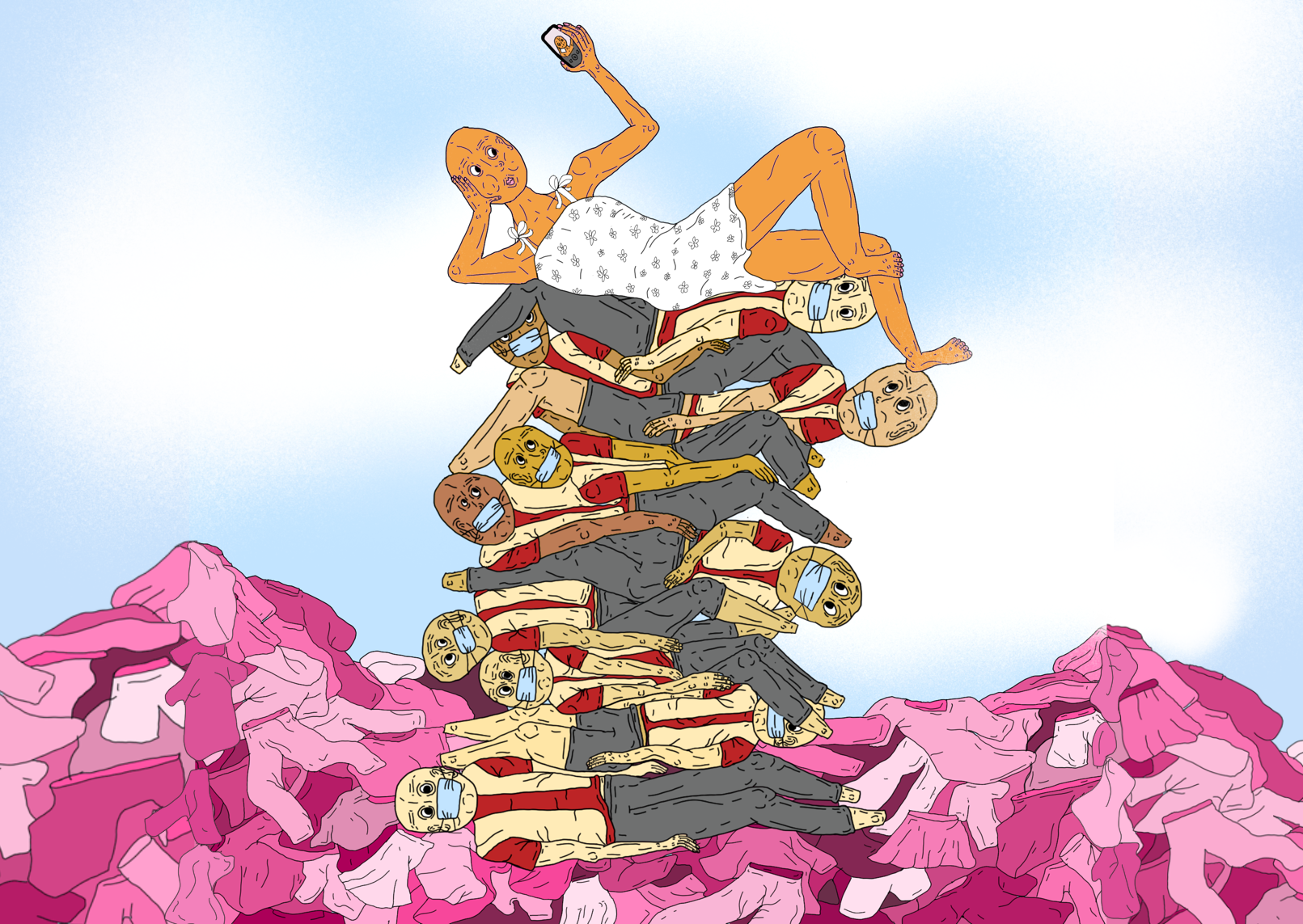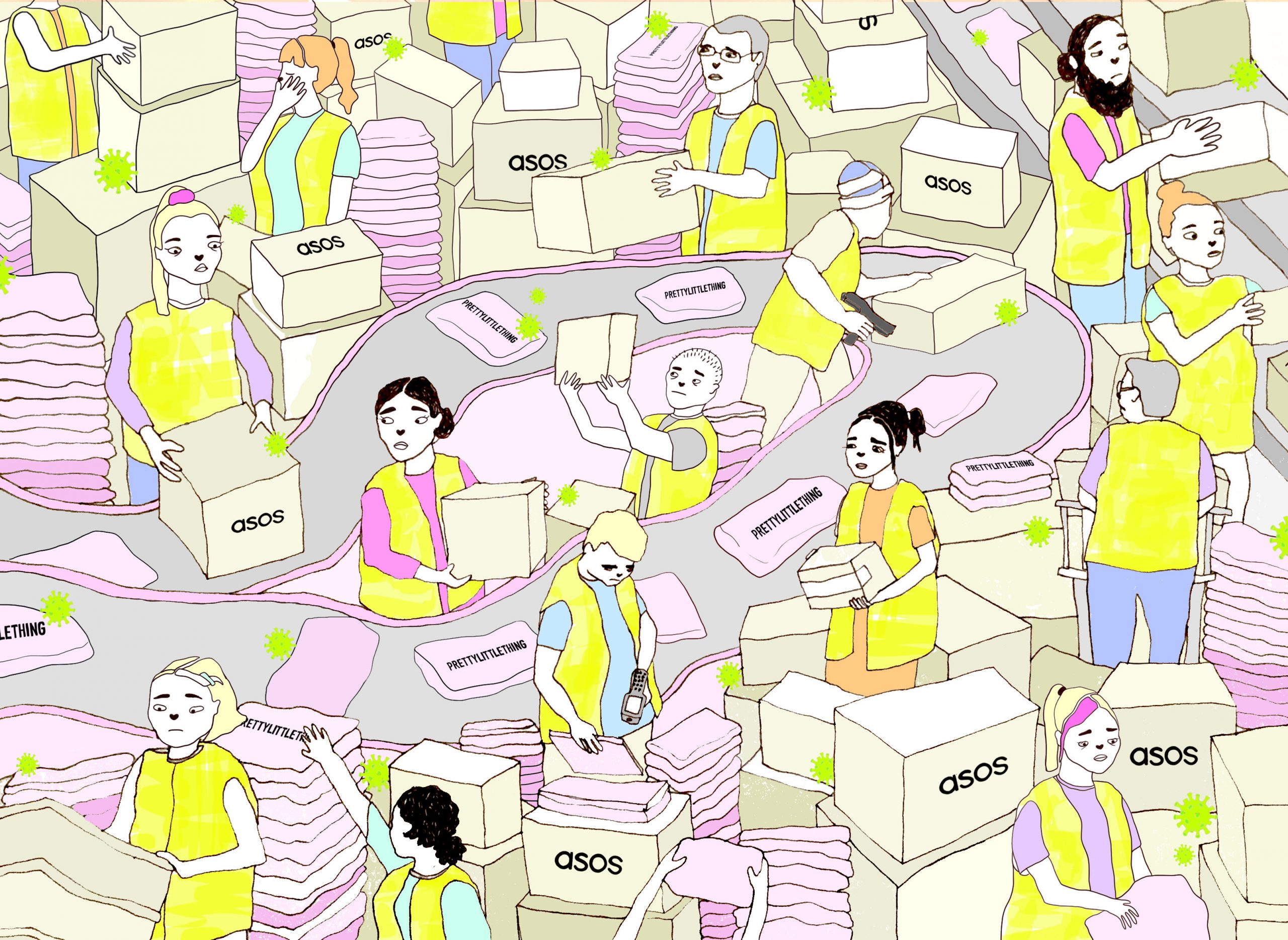FASHION WITHOUT COMPASSION
How online shopping during a global pandemic exposes the inhumanity of capitalism
By Andrea Loftus / 20 April 2020

Illustration by Freya Sprong (@f.sprongillust)
‘This is a pandemic. I don’t think anyone needs a bikini.’
This is a quote from a factory worker who is risking their safety during the Covid-19 pandemic to meet growing demands of online orders. These orders are coming from people stuck at home idly passing another hour of lockdown, bored and browsing the myriad of flash sales they have been enticed into through sponsored ads and a relentless stream of promotional emails. In this unprecedented moment in history, where nobody can simply nip to the store to buy an outfit or grab some art supplies, we turn to the wonder of the modern age – the worldwide web.
Pretty Little Thing, the infamous online brand with sickly-sweet pink plastic packaging, says the reason they will not furlough their employees is that ‘there remains sufficient work activity’. This translates as: thanks to boredom shopping, our weekly orders have tripled from over 120,000 to around 400,000 since lockdown. Now, I know that we may not be able to get all of our essentials at the stores that are open, but I'm pretty sure a new crop top doesn’t appear on that list.
People are also turning to Amazon, buying everything from face masks to paint-by-numbers to fill the stream of hours that blur into one during quarantine. This means that each line of production must remain open to facilitate supply and ensure profit, from the place of manufacture to the system of transit. This need to churn out a constant profit is not at all surprising from Jeff Bezos, Amazon CEO with a net worth of $138b, who recently fired two workers for publishing a petition that requested an improvement to safety measures in Amazon warehouses.
There is currently no specific guidance on whether it is safe to be handling online delivery packages, however we do know that the virus lives on surfaces and can transfer from skin to skin contact. Therefore, with each delivery you receive you may be putting yourself or the delivery person at a greater risk of catching the virus.

Illustration by Amara May (@illustrator.amara)
When the daily COVID-19 news conferences became ritualistic house viewings, we all saw the barbarism that ensued in our supermarkets, with panic driving customers to stockpile linguine and loo-roll like it was going out of fashion.
This not only meant that essential products like paracetamol, which people with chronic illnesses rely on, were out of stock, but also that supermarkets and warehouses had to employ thousands more staff to keep up with the demand from the public. Many of these vacancies have been filled by people adversely affected by the pandemic, who are now putting themselves at greater risk and often aren’t supplied with sufficient hygiene measures or protective clothing.
A woman with cystic fibrosis (CF) spoke on Radio 1 about how people with CF require almost double the daily calorie intake as the average person, and needless stockpiling means not being able to purchase the foods they need, which will likely be detrimental to their health.
As a society, we need to think about what’s important and what really constitutes ‘essential’. Yes, food stores have to stay open for essentials, but if we limit our shopping to just that we can help to ensure that there are fewer numbers of staff working less-punishing hours.
This goes for online clothes shopping, too. Sure, we all want to be comfy when working from home, but is it worthwhile buying another hoody just to take a break from the 7 sitting in your washing pile? Maybe you’ve received an aesthetically pleasing email from your favourite brand pushing colourful activewear that will better prepare you for that 5k you’ve been nominated to run...but is it really worth asking people to risk their lives making and then delivering it?
The reality is that we never know whether the size will be quite right or whether we'll prefer it in green or grey. Therefore, we find ourselves guiltlessly ordering one item in several sizes, or one style in different colours, side-lining the environmental footprint that comes along with the excess production and transport that returns require, and demanding too much of workers who should be staying at home.
An article on Eco Age articulates the mind-blowing waste margins that, in American alone, account for 2.25b kg of returned goods going to landfill or being shipped to developing countries.
Although some companies factor in the 30% revenue loss that comes with granting people the liberty to buy without direct consequence, during the current economic stasis these businesses are searching for ways to cut expenses further down the production line – starting with the people making the clothes.
The impact of the pandemic on the clothing industry isn’t felt solely by online brands, though Sophie Benson, a sustainable fashion journalist, spoke to Mostafiz Udin for an article on Eco Age about the impact of COVID-19 on his ethical-focused factory. He explained that a brand provides a Letter of Credit (LC) to a manufacturer for an order - bearing in mind brands sometimes plan for orders for the next few years - and the factory purchases raw materials and fabrics accordingly from their budget. Upon receipt of these products, this money is reimbursed, and the cycle restarts.
However, when there is no store open for these products to go into, these factories have the supplies for orders that brands no longer want. Among these brands are the budget giant Primark, which already has a reputation for not paying their workers the living wage and using greenwashing to cover their environmental footprint. According to the Bangladeshi and Garment Exporters Associations, over ¼ of garment workers in Bangladesh - around 1 million people - have been sent home unpaid because of these brands cancelling £2.4b of existing orders. Although the CEOs have taken a wage cut (after growing pressure), their livelihoods will return to normality much quicker than those of the workers left without a salary to live on during this time.
So what can we do? Supporting independent businesses is a no-brainer, but perhaps purchasing a gift card to use when lockdown ends will help to keep your favourite local spots afloat without forcing them to take relentless trips to the post office. Co-ops are also struggling, so encouraging people to donate - or donating yourself, if you’re able - is also a good place to start. If people are still comfortable using their daily walk to send some packages then try shopping through Depop or eBay, where the supply chain is smaller and it’s easy to shop for items that aren’t being shipped internationally. However, the most effective way to avoid contributing to the issue is to avoid shopping as much as possible. Unless your purchases are essential, try not to make any online at all, and instead delve into your wardrobe and see what you can put together with what you have - you never know what you’ll find!
Instagram pages such as @i.got.dressed.today are encouraging people to find new love in old clothes. It is important to fill your feed with messages of positivity right now. Try unfollowing pages like Boohoo and Missguided to reduce the likelihood of being tempted by their sale prices.


COVID-19 has well and truly exposed the depths corporations will sink to, and how ingrained materialism is in our lives. Yes, we need to keep the economy alive and in short, contributing to online shopping industry will help boost the economy during these times. However, we need to question the ethics of companies like Amazon who most likely could afford to take a short break from sales during the peak of the pandemic and pay their workers a fair wage to stay at home. If you do find yourself needing to order something online, try finding the source of the product and order from the smaller independent businesses that really do need the help to stay a float.
The global value chain is fragile, and the way a pandemic has broken it apart link-by-link makes it clear how a natural disaster, or period of social unrest, could easily do the same. We encourage you to share petitions that demand capable companies pay their workers, and that all companies, as a bare minimum, ensure that working conditions are safe and health is prioritised. We urge you to think about the wider impact the next time you share a post from a fast-fashion brand eager to win £200 to spend at their online store. The truth is, we need to advocate systematic change in all sectors to ensure that when things return to ‘normal’, it isn’t the inefficient and wasteful version of normal we had before.
Let us fight for a normal where health comes before wealth and inequality is something we fight, not sequin onto a t-shirt.
Sign this petition to encourage the government to take action and account for the safety of these workers: https://www.change.org/p/the-government-to-close-all-online-retailers-not-just-the-shop-fronts-all-come-from-the-same-warehouse
Sign this petition to make Primark and other brands take responsibility for agreed orders: https://www.change.org/p/unless-gap-primark-c-a-payup-millions-of-garment-makers-will-go-hungry
Art by
Words by
Edited by
Share this article

